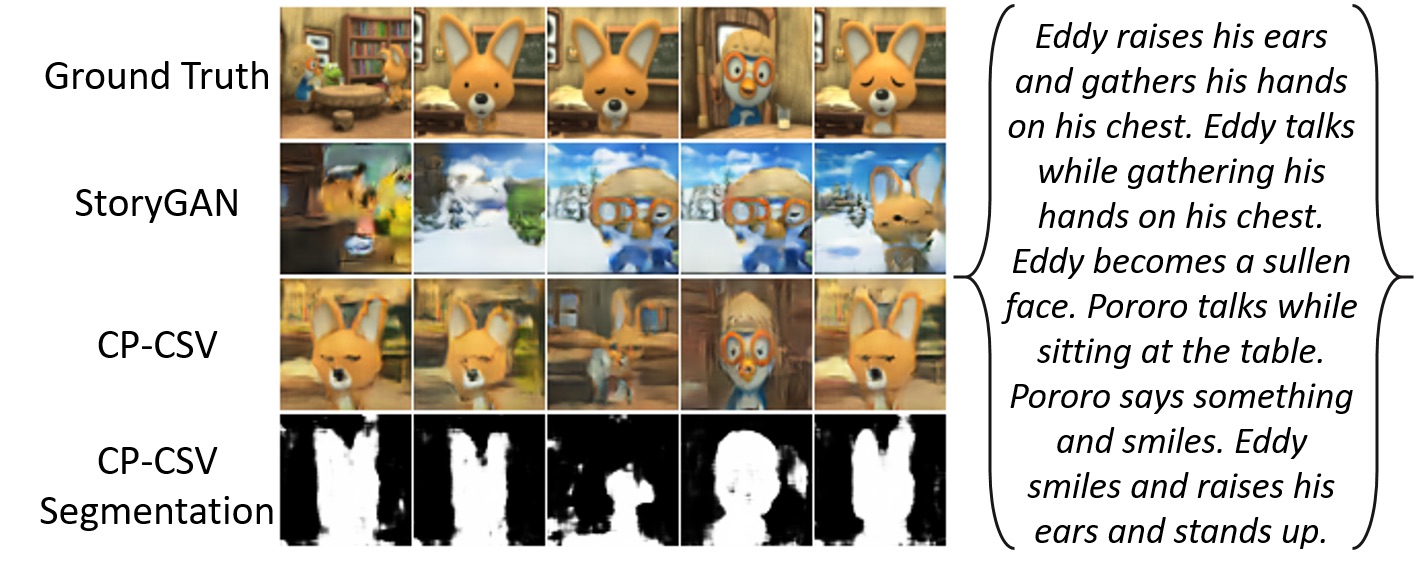Author: @yunzhusong, @theblackcat102, @redman0226, Huiao-Han Lu, Hong-Han Shuai
Code implementation for Character-Preserving Coherent Story Visualization
Objects in pictures should so be arranged as by their very position to tell their own story.
- Johann Wolfgang von Goethe (1749-1832)
In this paper we propose a new framework named Character-Preserving Coherent Story Visualization (CP-CSV) to tackle the challenges in story visualization: generating a sequence of images that emphasizes preserving the global consistency of characters and scenes across different story pictures.
CP-CSV effectively learns to visualize the story by three critical modules: story and context encoder (story and sentence representation learning), figure-ground segmentation (auxiliary task to provide information for preserving character and story consistency), and figure-ground aware generation (image sequence generation by incorporating figure-ground information). Moreover, we propose a metric named Frechet Story Distance (FSD) to evaluate the performance of story visualization. Extensive experiments demonstrate that CP-CSV maintains the details of character information and achieves high consistency among different frames, while FSD better measures the performance of story visualization.
-
PORORO images and segmentation images can be downloaded here. Pororo, original pororo datasets with self labeled segmentation mask of the character.
-
CLEVR with segmentation mask, 13755 sequence of images, generate using Clevr-for-StoryGAN
images/
CLEVR_new_013754_1.png
CLEVR_new_013754_1_mask.png
CLEVR_new_013754_2.png
CLEVR_new_013754_2_mask.png
CLEVR_new_013754_3.png
CLEVR_new_013754_3_mask.png
CLEVR_new_013754_4.png
CLEVR_new_013754_4_mask.png
Download link
virtualenv -p python3 env
source env/bin/activate
pip install -r requirements.txt
-
Download the Pororo dataset and put at DATA_DIR, downloaded. The dataset should contain SceneDialogues/ ( where gif files reside ) and *.npy files.
-
Modify the DATA_DIR in ./cfg/final.yml
-
The dafault hyper-parameters in ./cfg/final.yml are set to reproduce the paper results. To train from scratch:
./script.sh
- To run the evaluation, specify the --cfg to ./output/yourmodelname/setting.yml, e.g.,:
./script_inference.sh
Pretrained model (final_model.zip) can be download here.
-
Download the Pororo dataset and put at DATA_DIR, downloaded. The dataset should contain SceneDialogues/ ( where gif files reside ) and *.npy files.
-
Download the pretrained model, download, and put in the ./output directory.
-
Modify the DATA_DIR in ./cfg/final.yml
-
To evaluate the pretrained model:
./script_inference.sh
Use the tensorboard to check the results.
tensorboard --logdir output/ --host 0.0.0.0 --port 6009
The slide and the presentation video can be found in slides.
@inproceedings{song2020CPCSV,
title={Character-Preserving Coherent Story Visualization},
author={Song, Yun-Zhu and Tam, Zhi-Rui and Chen, Hung-Jen and Lu, Huiao-Han and Shuai, Hong-Han},
booktitle={Proceedings of the European Conference on Computer Vision (ECCV)},
year={2020}
}

